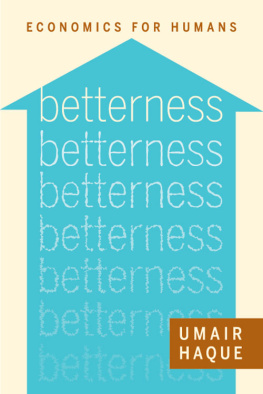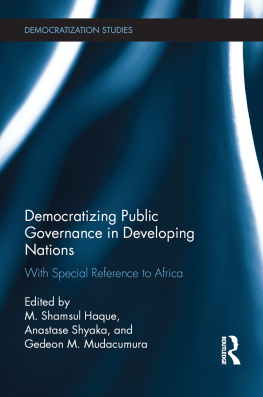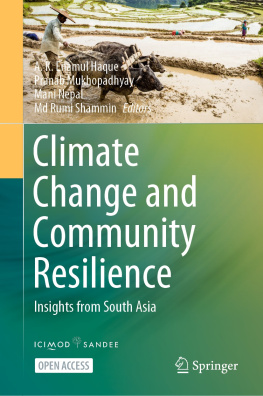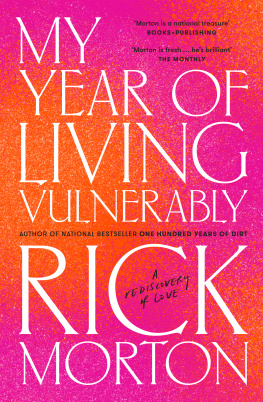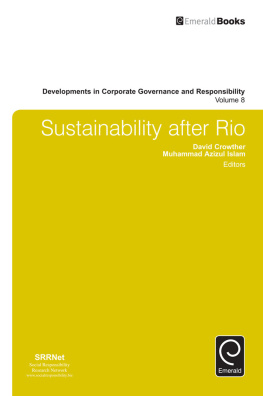Umair Haque - Betterness
Here you can read online Umair Haque - Betterness full text of the book (entire story) in english for free. Download pdf and epub, get meaning, cover and reviews about this ebook. publisher: Harvard Business Review Press, genre: Romance novel. Description of the work, (preface) as well as reviews are available. Best literature library LitArk.com created for fans of good reading and offers a wide selection of genres:
Romance novel
Science fiction
Adventure
Detective
Science
History
Home and family
Prose
Art
Politics
Computer
Non-fiction
Religion
Business
Children
Humor
Choose a favorite category and find really read worthwhile books. Enjoy immersion in the world of imagination, feel the emotions of the characters or learn something new for yourself, make an fascinating discovery.
- Book:Betterness
- Author:
- Publisher:Harvard Business Review Press
- Genre:
- Rating:5 / 5
- Favourites:Add to favourites
- Your mark:
- 100
- 1
- 2
- 3
- 4
- 5
Betterness: summary, description and annotation
We offer to read an annotation, description, summary or preface (depends on what the author of the book "Betterness" wrote himself). If you haven't found the necessary information about the book — write in the comments, we will try to find it.
Betterness — read online for free the complete book (whole text) full work
Below is the text of the book, divided by pages. System saving the place of the last page read, allows you to conveniently read the book "Betterness" online for free, without having to search again every time where you left off. Put a bookmark, and you can go to the page where you finished reading at any time.
Font size:
Interval:
Bookmark:
Get inspired. Stay informed. Join the discussion. Visit hbr.org/books.
Author Name: Umair Haque
Publisher: Harvard Business Review Press
Publication Date: 12/19/11
Copyright Notice: Umair Haque
Language: en-us
To Naqsh, Batul, and Shanzeh,
For cultivating their gardens
And teaching me why.
Near the turn of the twentieth century, a high priest became a heretic. After a lifetime spent pioneering the nascent discipline of psychology, the eminent Harvard professor William James asked a dangerous question that began turning his field upside down. Psychologys quest, he ventured, might just be larger than merely curing mental illness. What if the average personeven if mentally healthywere only living up to a small fraction of his or her potential?
Like a big bang, Jamess question ignited a great paradigm shift. Every discipline is founded on what American historian and philosopher of science Thomas Kuhn famously called a paradigm: a shared set of assumptions and frameworks. Fast forward to the discipline of positive psychology. Described by two of its founding scholars, the University of Pennsylvanias Martin Seligman and Claremont Graduate Universitys Mihaly Csikszentmihalyi as a psychology of positive human functioning, positive psychology upended the paradigm that preceded it: it is focused not merely on curing mental illness, but on fulfilling human potential.
Here is how positive psychologists Shelly L. Gable and Jonathan Haidt put it: orthodox psychology raises people up from negative eight to zero, but [its] not as good at understanding how people rise from zero to positive eight. Positive psychology leaps past the definition of mental health as merely being pathology free to achieving a state of optimal functioning: one where its possible to do more than merely function normally. Consider, for example, Csikszentmihalyis pioneering work on flow, a state of intense focus that lets greater heights of achievement be scaled: its a path to going beyond merely minimizing pathologyand toward maximizing potential.
The foundational principle of this school of thought isnt just to make up for a lack, but to expand the boundaries of the whole. Its aim isnt merely to raise the floor of the negative, but to heighten the ceiling of the positive. Its great revolution was to reconceive of a healthy mind not just as one that was less dysfunctional, but one capable, at its peak, of better, richer, wholer function.
Like psychology in Jamess time, economics in our time has been founded on what you might call a negative paradigm. Its apostles and pioneers, like Adam Smith in the eighteenth century, David Ricardo in the nineteenth, and Milton Friedman in the twentieth, have stood on one anothers shoulders to build a dogma whose fundamental doctrine was to erase the economic pathologies of the past. Just as being free of mental pathologies yields a healthy mind, the negative paradigm contends, so being free of economic pathologieslike obstacles and barriers to commerce and tradeyields a healthy economy. Which is why a healthy economy is still concisely summed up by Adam Smiths metaphor of the invisible hand, today simply taken to mean an economy where self-interested, profit-seeking corporations are free to sell products and services to consumers who are free to buy them, with the happy side effect of maximizing the volume of output. Just like the healthy mind of the nineteenth century was one free of mental pathologies, so the invisible hands free market is one cleansed of economic pathologies.
And with good reason. Think back, for example, to the dawn of the industrial age: the world was riddled withand crippled byeconomic pathology. Guilds protected local monopolies; mercantilist governments blocked flows of products and finance; owners of organizations bore unlimited liability for managerial mistakes; markets for products, people, and financing had little information about earnings and revenues to make informed decisions.
Hence, economics has been, like the negative psychology of the past, preoccupied with minimizing dysfunction, with removing barriers to commerce and trade. At the same time, an ever more complex framework of legislation and regulation prevents commerce from going wrong. Business as we know it, live it, and do it is the expression of this economics of antipathology.
Once upon a time, it took a royal charter to incorporate; today, it takes a mouse click and a credit card. Yesterdays pathologies are today, if not totally conquered, then at least mostly vanquished, and the recipe for sending them packing now formulated, packaged, and dispensed by the dozen under the label liberalize, privatize, and stabilize. Just like a patient on a nineteenth-century couch, our regimen rests on a foundational belief: that, at its best, an economy is one thats not visibly, wheezingly unhealthy.
Having spent centuries analyzing the manifold and variegated ways in which markets, corporations, and consumption can go wrongfrom a lack of competition, to a drought of information, to a shortage of skills, to a surfeit of red tapeweve spend decades plumbing the depths of efficiency, productivity, and effectiveness. Hence, modern theories of management also rest on this negative paradigm, and the modern manager exists largely to prevent dysfunction, limit deviance, and correct error, just as classical psychologists focused on ridding the conscious and unconscious mind of neuroses and phobias.
But perhaps, given the parlous state of global prosperity, merely ridding the economy of dysfunction might not be enough to power another century or more of wealth creation. Maybe merely erasing industrial-age dysfunction yields not a healthy economy, just a stagnant one.
While weve perfected a negative paradigm and learned to zap dysfunctions with the economic equivalent of superweapons, heres what we havent done: build a positive paradigm. In a positive paradigm, the healthiest state isnt just one that minimizes pathologies, but one that maximizes potential. The terra incognita weve never explored is whether its possible for prosperity and human exchange not merely to go less wrong, but more right.
Im no William James, but if youll permit me, Id like to pose a question. Though the pathologies of the distant past may have been cured, what if, just maybe, the economy is only living up to a fraction of its potential?
Just as we no longer understand a healthy mind to simply mean one free of dysfunction, but to mean a mind that can scale higher and higher peaks of emotional and cognitive function, Id argue that the time has come for us to reconceive our definition of a healthy economy to go beyond corporations and markets that are less sick, freer of pervasive organizational and managerial disorder. A positive economic paradigm doesnt merely conceive of health as maximizing profit by minimizing waste but as redefining the outer limits of human achievement. Call me an unrepentant optimist, but Id bet that billions of brow-mopping person hours spent on bigger SUVs, smellier deodorants, and jumbo-sized fast food isnt the lofty apex of humankinds untrammeled potential. Id wager the farm, the house, the 401(k), and the tasseled loafers on the following proposition: that the sum total of human effort can add up to not merely more, but to better.
What if commerce, companies, and trade can make us better off in bigger, more enduring, more human ways than simply
Font size:
Interval:
Bookmark:
Similar books «Betterness»
Look at similar books to Betterness. We have selected literature similar in name and meaning in the hope of providing readers with more options to find new, interesting, not yet read works.
Discussion, reviews of the book Betterness and just readers' own opinions. Leave your comments, write what you think about the work, its meaning or the main characters. Specify what exactly you liked and what you didn't like, and why you think so.

